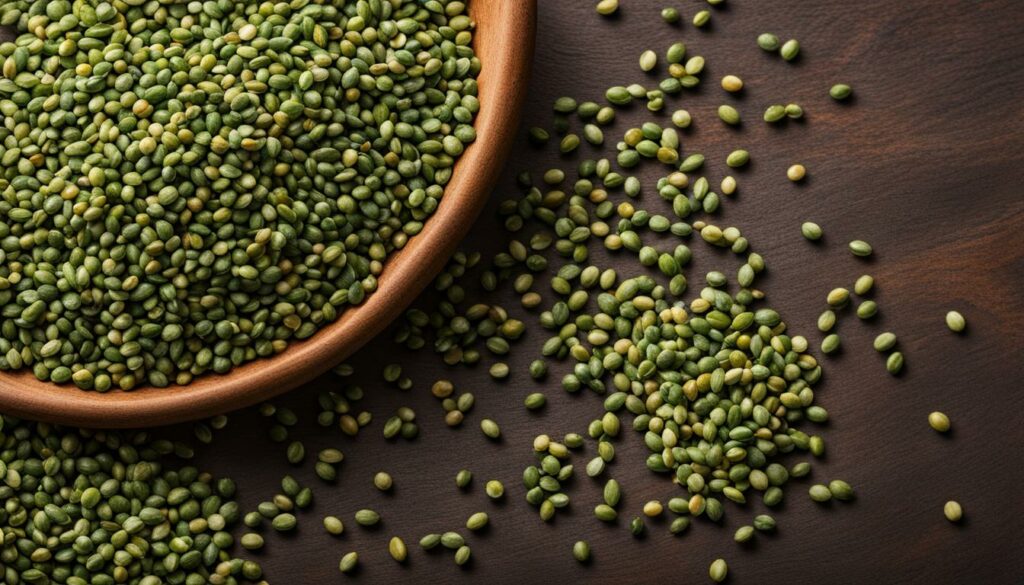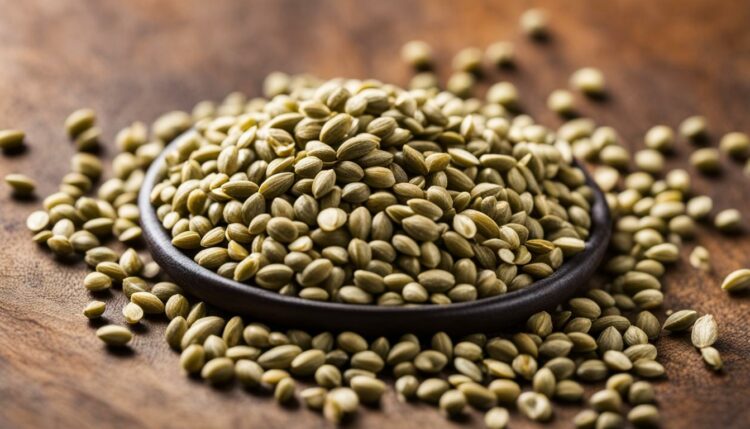Did you know that hemp seeds are packed with an abundance of nutrients, earning them the title of a superfood? These tiny seeds offer a plethora of health benefits that can have a significant impact on your overall well-being.
From providing a complete source of protein to supporting heart health and promoting brain function, hemp seeds are an incredible addition to a balanced diet.
Key Takeaways:
- Hemp seeds are a complete source of protein, containing all nine essential amino acids.
- They are rich in heart-healthy omega-3 and omega-6 fatty acids, promoting cardiovascular well-being.
- Hemp seeds are a good source of dietary fiber, aiding digestion and supporting weight management.
- They are a nutrient powerhouse, containing an array of vitamins, minerals, and antioxidants.
- Hemp seeds may have potential benefits for brain health and skin conditions, due to their antioxidant and fatty acid content.
Protein Powerhouse
Hemp seeds are a great source of protein, containing nearly as much protein as soybeans. They are a complete source of protein, providing all nine essential amino acids that the body cannot produce.
The amino acid arginine, found in abundance in hemp seeds, has benefits for heart health. Adding hemp seeds to a vegetarian or vegan diet can be especially beneficial due to their protein content.
Did you know that hemp seed protein is considered a complete source of protein? This means that it contains all nine essential amino acids that our bodies need but cannot produce on their own.
Hemp seeds offer a plant-based alternative to animal-derived protein sources and can be especially beneficial for individuals following a vegetarian or vegan diet.
The amino acid arginine, which is found in abundance in hemp seeds, has been shown to have several health benefits.
Arginine plays a crucial role in promoting heart health by improving blood flow and supporting the healthy functioning of blood vessels. It has also been linked to improved immune function and wound healing.
Here are some noteworthy facts about hemp seed protein:
Hemp seeds contain nearly as much protein as soybeans.
Hemp seeds are a complete source of protein, providing all essential amino acids.
Arginine, an amino acid abundant in hemp seeds, has benefits for heart health.
Hemp seeds can be easily incorporated into a variety of dishes. Sprinkle them on salads, add them to smoothies, or use them as a topping for yogurt or oatmeal. Their mild, nutty flavor complements many recipes and adds a nutritious boost of protein to your meals.
Include the following table to provide a visual representation of the nutritional content of hemp seed protein:
| Nutrient | Amount per 30g Serving |
|---|---|
| Protein | 10g |
| Fiber | 3g |
| Healthy Fats | 15g |
| Essential Amino Acids | All 9 |
As you can see, hemp seed protein offers a substantial amount of protein, along with fiber and healthy fats. It’s a versatile and nutritious addition to any diet.
Next, let’s explore the heart-healthy omega fatty acids found in hemp seeds and their benefits for cardiovascular health.
Heart-Healthy Omega Fatty Acids
Hemp seeds are a nutritional powerhouse, packed with essential fatty acids that promote heart health. These fatty acids, including omega-3s and omega-6s, play a crucial role in maintaining a healthy cardiovascular system.
The omega-3 fatty acids found in hemp seeds have been extensively studied for their beneficial effects on heart health. Research suggests that these fatty acids can help lower blood pressure, reduce inflammation, and decrease the risk of heart disease.
Including omega-3s in your diet has been associated with a lower incidence of heart attacks, strokes, and other cardiovascular problems.
The omega-6 fatty acids present in hemp seeds also contribute to heart health. These fatty acids support proper functioning of the heart and help maintain healthy cholesterol levels. The ratio of omega-3s to omega-6s in hemp seeds is considered ideal, promoting a healthy balance between the two.
The Benefits of Omega Fatty Acids for the Heart
Omega-3 fatty acids are known for their role in reducing inflammation, a contributing factor to heart disease. By reducing inflammation, omega-3s can help prevent the buildup of plaque in the arteries, improving blood flow and reducing the risk of blockages.
Omega-6 fatty acids, on the other hand, support the production of substances that help regulate blood pressure and prevent blood clot formation. This can reduce the strain on the heart and lower the risk of cardiovascular events.
Consuming hemp seeds or hemp seed oil is an excellent way to incorporate these heart-healthy omega fatty acids into your diet. Hemp seed oil, in particular, is rich in these beneficial fatty acids, making it a valuable addition to any heart-healthy eating plan.
| Omega-3 Fatty Acids | Omega-6 Fatty Acids |
|---|---|
| Reduce inflammation | Regulate blood pressure |
| Improve blood flow | Prevent blood clot formation |
| Lower the risk of heart disease | Support heart function |
Including hemp seeds or hemp seed oil in your diet may offer numerous heart health benefits. However, it’s important to note that these seeds should be consumed as part of a balanced diet and healthy lifestyle, rather than as a standalone solution.
Consult with a healthcare professional or nutritionist for personalized advice on incorporating hemp seeds into your diet to support heart health.

Fiber for Digestive Health
Hemp seeds are not only rich in protein and essential fatty acids but also provide a significant amount of dietary fiber. Both soluble and insoluble fiber can be found in hemp seeds, making them a great choice for promoting digestive health.
Fiber plays a crucial role in maintaining a healthy digestive system. It adds bulk to the stool, allowing for regular bowel movements and preventing constipation. Consuming adequate amounts of fiber can also help regulate blood sugar levels and promote a feeling of fullness, which can aid in weight management.
Hemp seed fiber has several benefits for digestive health, including:
- Promoting regular bowel movements: The insoluble fiber in hemp seeds adds bulk to the stool, preventing constipation and ensuring smooth digestion.
- Supporting gut health: Consuming enough fiber can help create a favorable environment for beneficial gut bacteria, contributing to a healthy microbiome.
- Reducing the risk of certain diseases: A high-fiber diet has been linked to a decreased risk of colon cancer and other digestive disorders.
To illustrate the fiber content of hemp seeds, take a look at the following table:
| Nutrient | Amount per 100g |
|---|---|
| Fiber | 7.6g |
The fiber content in hemp seeds contributes to their overall nutritional value and makes them an excellent choice for individuals looking to improve their digestive health.
Adding hemp seeds to your diet is easy and versatile. Sprinkle them on salads, blend them into smoothies, or use them as a topping for yogurt or oatmeal. By incorporating hemp seeds into your daily meals, you can boost your fiber intake and support a healthy digestive system.
Nutrient Powerhouse
Hemp seeds are not only rich in protein and fiber but also packed with essential vitamins, minerals, and antioxidants. These nutrients play a crucial role in various bodily functions, contributing to overall health and wellbeing.
Vitamins and Minerals
Hemp seeds are a powerhouse of vitamins and minerals, providing a wide range of essential nutrients. They are particularly high in:
- Vitamin E: Plays a vital role in protecting cells from oxidative stress.
- Phosphorus: Supports bone health and aids in energy metabolism.
- Potassium: Important for maintaining proper heart and muscle function.
- Calcium: Essential for bone health and muscle contractions.
- Iron: Necessary for the production of red blood cells and oxygen transport.
- Zinc: Supports immune function and helps with wound healing.
- B vitamins: Including thiamine, riboflavin, niacin, vitamin B6, and folate, which are involved in various metabolic processes within the body.
These vitamins and minerals are crucial for maintaining optimal bodily functions, from energy production to immune support. By incorporating hemp seeds into your diet, you can easily boost your nutrient intake and promote overall wellbeing.
Antioxidant Effects
Hemp seeds also contain antioxidants, which help protect the body against oxidative stress and damage caused by free radicals. Antioxidants play a crucial role in neutralizing harmful molecules and reducing inflammation.
One of the antioxidants found in hemp seeds is cannabidiol (CBD), which has gained popularity for its potential health benefits. Although more research is needed, studies suggest that CBD may have neuroprotective and anti-inflammatory effects, contributing to brain health and overall wellness.

Nutritional Profile of Hemp Seeds
| Nutrient | Amount per 100g |
|---|---|
| Protein | 30g |
| Fiber | 8g |
| Fat | 49g |
| Vitamin E | 9.46mg |
| Phosphorus | 1160mg |
| Potassium | 700mg |
| Calcium | 70mg |
| Iron | 7.95mg |
| Zinc | 7.95mg |
| Vitamin B6 | 0.6mg |
Source: USDA National Nutrient Database for Standard Reference.
Brain Health and Skin Conditions
The antioxidants found in hemp seeds, including cannabidiol (CBD), may have neuroprotective and anti-inflammatory effects, potentially benefiting brain health and neurological conditions.
Additionally, the fatty acids in hemp seeds, such as omega-3s and gamma-linolenic acid (GLA), have been linked to reduced inflammation and improved skin conditions, including acne and atopic dermatitis.
Research suggests that the antioxidants in hemp seeds can help protect the brain against oxidative stress and inflammation, which are associated with various neurological conditions. CBD, in particular, has shown promise in reducing inflammation in the brain and supporting overall brain health.
Furthermore, the fatty acids in hemp seeds play a crucial role in maintaining healthy skin. Omega-3 fatty acids help nourish the skin and improve its appearance, while GLA has been found to have anti-inflammatory properties, benefiting individuals with inflammatory skin conditions like acne and atopic dermatitis.
While more research is still needed to fully understand the extent of hemp seeds’ potential benefits for brain health and skin conditions, their antioxidant content and fatty acid profile make them a promising natural remedy. Incorporating hemp seeds into your diet may contribute to improved brain function and healthier skin.
| Benefits | Brain Health | Skin Conditions |
|---|---|---|
| Neuroprotective effects | Evidence suggests that hemp seed antioxidants, including CBD, may have neuroprotective effects in the brain. | No direct evidence of hemp seed antioxidants’ effects on skin conditions, but their anti-inflammatory properties may contribute to improved skin health. |
| Anti-inflammatory properties | The fatty acids, omega-3s, and GLA present in hemp seeds can help reduce brain inflammation, potentially benefiting brain health. | Fatty acids in hemp seeds, such as omega-3s and GLA, have been associated with reduced skin inflammation, improving conditions like acne and atopic dermatitis. |
| Overall brain health | Consuming hemp seeds that contain antioxidants and fatty acids may support brain health and functioning. | While no direct evidence exists, the anti-inflammatory and nourishing properties of hemp seed fatty acids may contribute to healthier skin. |
Conclusion
Hemp seeds have gained widespread recognition for their numerous health benefits, making them an excellent choice for anyone looking to enhance their diet. Packed with essential nutrients, hemp seeds offer a range of advantages that promote overall wellbeing.
One of the key benefits of hemp seeds is their ability to support heart health. With their optimal ratio of omega-3 and omega-6 fatty acids, these tiny seeds can lower blood pressure, reduce inflammation, and contribute to a healthier cardiovascular system.
Furthermore, hemp seeds are a great addition for supporting digestive health due to their high fiber content. Fiber aids in healthy digestion, promotes a feeling of fullness, and can help manage weight effectively. Incorporating hemp seeds into your meals can support gut health and reduce the risk of various diseases, including colon cancer.
Lastly, hemp seeds may have positive effects on the brain and skin. Their antioxidant properties, combined with the presence of fatty acids like omega-3s and gamma-linolenic acid (GLA), show promise in supporting brain health and improving skin conditions such as acne and atopic dermatitis.
Adding hemp seeds to your daily diet is simple and versatile. You can sprinkle them on cereals, blend them into smoothies, use them in baking, or enjoy them as a nutritious topping for salads.
With their rich profile of essential nutrients and numerous health benefits, hemp seeds provide a natural and nourishing choice for overall wellbeing.
FAQ
What are the health benefits of hemp seeds?
Hemp seeds offer numerous health benefits, including being a complete source of protein, high in heart-healthy omega fatty acids, a good source of fiber for digestive health, rich in vitamins and minerals, and potentially beneficial for brain health and skin conditions.
Are hemp seeds a good source of protein?
Yes, hemp seeds are a protein powerhouse, containing nearly as much protein as soybeans. They are a complete source of protein, providing all nine essential amino acids that the body cannot produce. The amino acid arginine, found in abundance in hemp seeds, has benefits for heart health.
Do hemp seeds provide omega fatty acids?
Absolutely! Hemp seeds are rich in essential fatty acids, including omega-3s and omega-6s. These fatty acids have been linked to improved heart health and a reduced risk of heart disease. The balance of omega-3s to omega-6s in hemp seeds is ideal for promoting a healthy heart.
How can hemp seeds benefit digestive health?
Hemp seeds are a good source of dietary fiber, which is essential for healthy digestion. The soluble and insoluble fiber in hemp seeds can aid in weight management, promote a feeling of fullness, regulate blood sugar levels, support gut health, and reduce the risk of certain diseases, such as colon cancer.
Are hemp seeds rich in vitamins and minerals?
Yes, hemp seeds contain an impressive array of vitamins and minerals. They are a good source of vitamin E, phosphorus, potassium, calcium, iron, zinc, and B vitamins. These nutrients play vital roles in various bodily functions and contribute to overall health and wellbeing.
Can hemp seeds benefit brain health and skin conditions?
The antioxidants found in hemp seeds, including cannabidiol (CBD), may have neuroprotective and anti-inflammatory effects, potentially benefiting brain health and neurological conditions.
Additionally, the fatty acids in hemp seeds, such as omega-3s and gamma-linolenic acid (GLA), have been linked to reduced inflammation and improved skin conditions, including acne and atopic dermatitis.
How can I incorporate hemp seeds into my diet?
Hemp seeds are highly versatile and can be easily incorporated into your diet. They can be sprinkled on cereals, added to smoothies, used in baking, or enjoyed as a topping for salads. With their numerous health benefits and delicious nutty flavor, hemp seeds are a nutritious choice for overall wellbeing.




